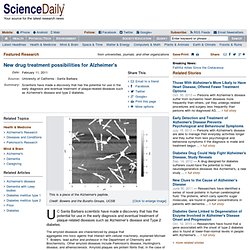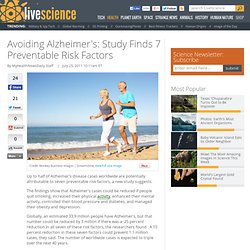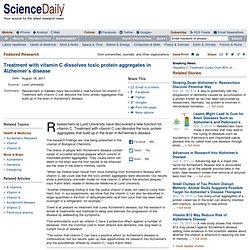

November. October. September. August. New drug treatment possibilities for Alzheimer's. UC Santa Barbara scientists have made a discovery that has the potential for use in the early diagnosis and eventual treatment of plaque-related diseases such as Alzheimer's disease and Type 2 diabetes.

The amyloid diseases are characterized by plaque that aggregates into toxic agents that interact with cellular machinery, explained Michael T. Bowers, lead author and professor in the Department of Chemistry and Biochemistry. Other amyloid diseases include Parkinson's disease, Huntington's disease, and atherosclerosis. Amyloid plaques are protein fibrils that, in the case of Alzheimer's disease, develop prior to the appearance of symptoms. "The systems we use are model systems, but the results are groundbreaking," said Bowers.
Their work is published in a recent issue of Nature Chemistry. Bowers and his research team used a method called ion-mobility spectrometry-mass spectrometry (IMS-MS). The first author of the paper is Christian Blieholder, a Humbolt Postdoctoral Fellow at UCSB. New ways to detect and treat Alzheimer's disease. SAN DIEGO — New studies identify brain changes in people with Alzheimer's disease.

The results give researchers a greater understanding of the disease and may help at-risk individuals by improving early detection. New animal research also shows a novel approach to Alzheimer's vaccine design that may avoid dangerous side effects. These new results were reported at Neuroscience 2010, the annual meeting of the Society for Neuroscience and the world's largest source of emerging news on brain science and health. Drop of blood diagnoses Alzheimer's. Half of Alzheimer's disease cases may be preventable. By Tom Moberly, 19 July 2011 Dr Deborah Barnes and Dr Kristine Yaffe from the University of California, San Francisco, looked at the evidence for potentially modifiable risk factors for Alzheimer’s disease.

The researchers concluded that up to half of Alzheimer’s disease cases could result from seven risk factors. These seven were: smoking, lack of physical activity, lack of mental activity, uncontrolled blood pressure and diabetes, and obesity and depression. Dr Barnes and Dr Yaffe found that low education and smoking were the two factors which could potentially be attributed to the greatest number of cases. ‘The most effective strategies for lowering Alzheimer’s disease prevalence might be public education campaigns and smoking cessation initiatives,’ they said. They concluded: ‘Randomised controlled trials are crucially needed to directly assess the effect of single and multiple risk factor reduction strategies on Alzheimer’s disease.’
Avoiding Alzheimer's: Study Finds 7 Preventable Risk Factors. Up to half of Alzheimer's disease cases worldwide are potentially attributable to seven preventable risk factors, a new study suggests.

The findings show that Alzheimer's cases could be reduced if people quit smoking, increased their physical activity, enhanced their mental activity, controlled their blood pressure and diabetes, and managed their obesity and depression. Globally, an estimated 33.9 million people have Alzheimer's, but that number could be reduced by 3 million if there was a 25 percent reduction in all seven of these risk factors, the researchers found . A 10 percent reduction in these seven factors could prevent 1.1 million cases, they said. The number of worldwide cases is expected to triple over the next 40 years. Lessons about Alzheimer's disease. Vitamin B supplements could delay onset of Alzheimer's, says study. Taking daily supplements of B vitamins may delay the onset of Alzheimer's disease, scientists have claimed.

The discovery that people in the early stages of failing memory can retain more of their mental faculties for longer if they take the tablets regularly could lead to treatments for the condition. Some participants in the Oxford University trial saw their neurological decline reduced by as much as half after using B vitamins. That breakthrough has raised hopes that the vitamins, which are sold in chemists and health food stores, could at least slow down, if not prevent, the shrinkage that affects many older people's brains. Vitamin B tablets are popular among vegans, because they shun some of the foods in which vitamin B is found – fish, meat and milk – and among sufferers of pernicious anaemia. Treatment with vitamin C dissolves toxic protein aggregates in Alzheimer's disease. Researchers at Lund University have discovered a new function for vitamin C.

Treatment with vitamin C can dissolve the toxic protein aggregates that build up in the brain in Alzheimer's disease. The research findings are now being presented in the Journal of Biological Chemistry. The brains of people with Alzheimer's disease contain lumps of so-called amyloid plaques which consist of misfolded protein aggregates. They cause nerve cell death in the brain and the first nerves to be attacked are the ones in the brain's memory centre. "When we treated brain tissue from mice suffering from Alzheimer's disease with vitamin C, we could see that the toxic protein aggregates were dissolved.
"Another interesting finding is that the useful vitamin C does not need to come from fresh fruit.